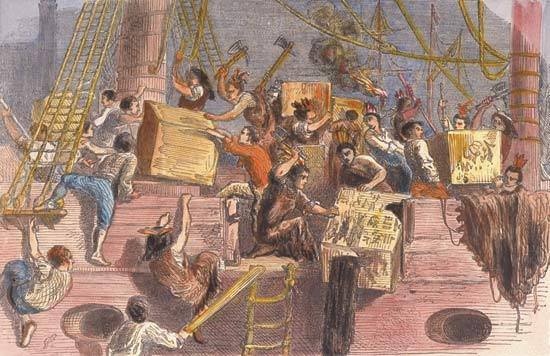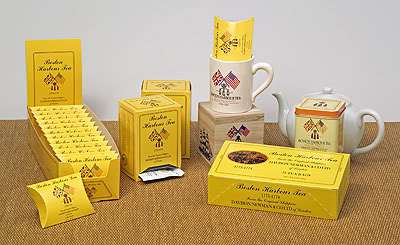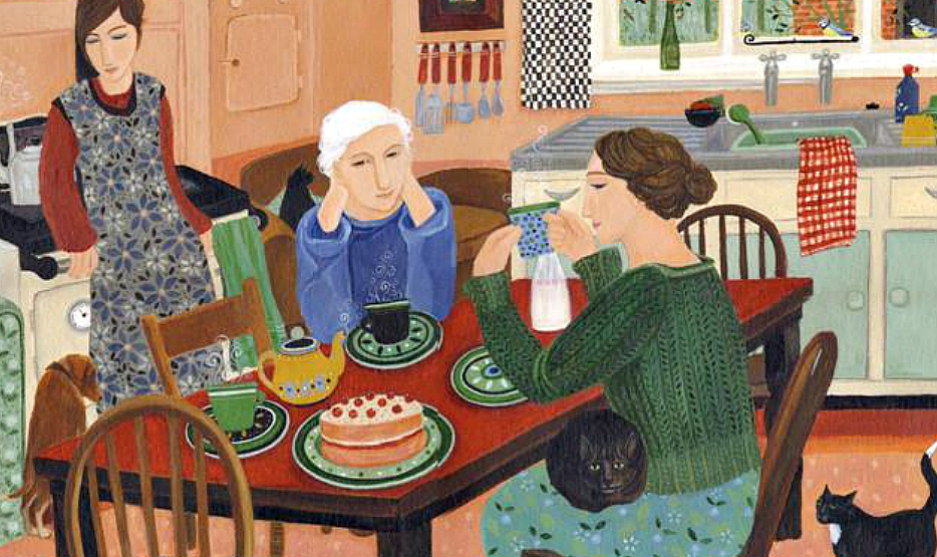
Where: Griffin’s Wharf, Boston Harbor
When: Thursday, December 16, 1773, 7-10 p.m.
Who: 116 colonists, many of whom belonged to The Sons of Liberty
Why: Taxation without representation
Attire: Mohawk Indian garb
Libations: 45 tons of Chinese tea, worth approximately $1 million (today’s rate), sold by the British East India Company
Servers: Three American ships — the Dartmouth, Eleanor, and Beaver
After Effect: the American Revolution

Don your tricorns and feathered headdresses! Sharpen your tomahawks!
Today we’re serving tea flavored with liberty, freedom, and independence. Drink it from a bottomless cup passed down to us by our founding fathers. Since we actually sip liberally from it every day, it’s good to reflect on its making.
Did you know that the Boston Tea Party wasn’t carried out by an angry, unruly mob? According to John Adams, a group of sober citizens emptied the contents of 342 chests of tea into the harbor with “great order, decency, and submission to government.” A large number of silent onlookers witnessed this historic event, and when it was over, the wharf was swept clean and the streets became as quiet as a Sabbath evening.
This brave act of defiance spawned similar tea parties in New York, New Jersey, and Maryland. A second Boston tea party also took place in 1774, where 16 chests of tea from Britain’s oldest tea merchant, Davison, Newman & Co., were similarly destroyed.
Many poems were written during these turbulent times, to rouse support for tea boycotts. They were published in newspapers, printed in broadsides posted on street posts, and circulated among the masses in the form of pamphlets. Citizens were urged to give up their “precious Bohea and Hyson” teas, in favor of red clover or redroot infusions.
The following anti-tea poem, published in several American newspapers during the period leading up to the Revolution, captures the prevailing spirit and sentiment of the colonists. It is interesting since it is told from the woman’s point of view.
A LADY’S ADIEU TO HER TEA-TABLE
FAREWELL the Tea-board with your gaudy attire,
Ye cups and ye saucers that I did admire;
To my cream pot and tongs I now bid adieu;
That pleasure’s all fled that I once found in you.
Farewell pretty chest that so lately did shine,
With hyson and congo and best double fine;
Many a sweet moment by you I have sat,
Hearing girls and old maids to tattle and chat;
And the spruce coxcomb laugh at nothing at all,
Only some silly work that might happen to fall.
No more shall my teapot so generous be
In filling the cups with this pernicious tea,
For I’ll fill it with water and drink out the same,
Before I’ll lose LIBERTY that dearest name,
Because I am taught (and believe it is fact)
That our ruin is aimed at in the late act,
Of imposing a duty on all foreign Teas,
Which detestable stuff we can quit when we please.
LIBERTY’S The Goddess that I do adore,
And I’ll maintain her right until my last hour,
Before she shall part I will die in the cause,
For I’ll never be govern’d by tyranny’s laws.
One hundred years later, “A Ballad of the Boston Tea Party,” by Oliver Wendell Holmes, was read at a meeting of the Massachusetts Historical Society. Here is part of Holmes’ account:

An evening party, — only that,
No formal invitation,
No gold-laced coat, no stiff cravat,
No feast in contemplation,
No silk-robed dames, no fiddling band,
No flowers, no songs, no dancing, —
A tribe of red men, axe in hand, —
Behold the guests advancing!
(The poem can be read in its entirely here.)
The Boston Tea Party was one of several crucial events leading up to the American Revolution. The Tea Act, which actually lowered the price of tea, but did not eliminate any levies on it, was designed to prevent the East India Company from going bankrupt, not to benefit the colonists. This was a party held not on price, but on principle.
So let’s toast those brave Bostonians of long ago! After all, how often does tea so dramatically change the course of history?

To really get into the spirit of things, try some Boston Harbour Tea, manufactured by Davison, Newman & Co., who is still in business today! It’s a select blend of Ceylon and Darjeeling teas with a sweet aroma and brisk flavor. (Drink this with caution if you tend toward inciting revolutions.)
For more about the Boston Tea Party, visit the BTP Historical Society website. Lots of interesting facts there, including a roster of tea party participants, personal accounts, and a look at one of the original tea chests.
Check in with cloudscome at a wrung sponge for today’s Poetry Friday Roundup. A very special Crown of Sonnets, “Cutting a Swath,” is being presented by seven of the blogosphere’s most accomplished poets. Don’t miss it!
April is Tea Party Month here at alphabet soup! Post or send me your favorite tea time recipes, sweet or savory: readermail (at) jamakimrattigan (dot com). Do join us!

Thanks for this great post and poems. I’m definitely going to look for some Boston Harbour Tea!
writer2b
LikeLike
All I can think of is: what would I have done if they’d have asked me to give up coffee? I’d like to think I’d have been brave for Liberty, but hoo-boy, it gives me the absolute shudders just supposing it.
Great post, Jama. I’m loving your month long Tea Party.
LikeLike
I live in Massachusetts! I write historical fiction! And yet when you said the most famous tea party, my mind went to Alice and the Mad Hatter. Thanks for setting me straight again! And I’m going to try to send you my favorite scone recipe soon.
LikeLike
It’s pretty cool that Davison & Newman still exists. And I love Darjeeling — so I’m sure this stuff is probably good.
LikeLike
I’m sure you’re not alone with the coffee thing, but it would be an interesting test of loyalty, wouldn’t it? Lots of smuggling went on to compensate. The red clover and redroot tisanes just didn’t cut it.
LikeLike
Don’t worry. The Mad Hatter is coming up. We’ll excuse you this one time for not thinking of the BTP first, if you send along your scone recipe 🙂 . . .
LikeLike
Ok. That’s it. I’m setting aside my cup of decaffeinated joe and brewing a pot right now…
LikeLike
Yay! I hope you plan to wear feathers today, too.
LikeLike
Tea
I always enjoy stopping here for a cup of tea. Thanks. 🙂
LikeLike
Re: Tea
Have another crumpet!
LikeLike
TadMack says: 🙂
There’s a bit of revisionist history going ’round about the Boston Tea Party, and how it was just a band of ne’er do well ruffians causing trouble, but I love that everyone was in on it together — even the Fine Lady saying goodbye to her tea set.
Speaking of, I have a recipe for tea cakes my Dad used to make that I’ll be sending your way. I have company until Wednesday from the U.S., so you may have to remind me, but I have it! 🙂 Cheers! And thanks for sharing the news about our Crown!
LikeLike
From a. fortis
How cool! I’ve never seen these, and I guess I never really thought about poetry written about the anti-tea movement. Thank you so much for sharing it!
LikeLike
Tea Parties
I am sitting here reading this on my third cup of Yorkshire Gold tea. For a really traditional cup of English black tea you can’t do better. It’ll put hairs on your chest.
I have been watching the John Adams serial on telly and they showed the captain of the ship being tarred and feathered. I don’t know if that was just added for effect or not.
LikeLike
Re: TadMack says: 🙂
I hadn’t heard about the “band of ne’er do well ruffians.” It’s certainly possible. Maybe the account we’ve been learning in the history books is simply more politically acceptable . . .
Ooh, salivating at the thought of your Dad’s teacakes! Have fun with your company. The crown of sonnets still has me reeling . . .
LikeLike
Re: From a. fortis
These were new to me, too. It was exciting discovering them, and learning more details about the BTP.
LikeLike
Re: Tea Parties
I’ve got some Yorkshire Gold in my tea cupboard. I save it for when I need serious bracing up (and don’t mind bouncing off the walls all day).
The tar and feathers does sound Hollywoodish to me. How exciting can a sedate act of defiance be for the mass audience? Thank you for sharing that!
LikeLike